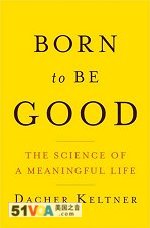Los Angeles
04 March 2009
 |
Dacher Keltner says people are self-interested and can be fiercely competitive, but that is just part of the story. He says recent studies of the brain and his own research on the nervous system show that human behavior has another side. As Professor Keltner explains it, people are hard-wired to be concerned with others, even with those beyond their immediate family.
"There are all kinds of studies showing that certain parts of the brain light up when we give to others, that there are branches of the nervous system, like something I study in my lab called the vagus nerve that helps us take care of non-kin and to give and to sacrifice," he said.
He says the vagus nerve, which starts at the top of the spinal cord and extends down through the chest, is related to vocalization, heart and breathing rates, digestion and other functions, and he says it is most active when people engage in acts of compassion.
The psychologist says humans evolved in communities and that evolution selected for traits that promote cooperation. The interaction starts at birth, as helpless human infants rely on others for their care. He says chemicals in the nervous system actually make it pleasurable to give and sacrifice.
"One is oxytocin. Oxytocin is a little neuropeptide that floats through your brain and your bloodstream," he said. "It's involved in uterine contractions. And it also in humans is involved in feelings of love, devotion. If you give a person oxytocin and you give them a lump sum of money and you ask them to give some amount to a stranger they have never met, they give away almost all their money."
He says another neuro-chemical that promotes cooperation is dopamine.
 |
| Dacher Keltner |
"Charles Darwin, actually, in The Descent of Man in 1871 made a strong case that kindness and cooperation are built into the human organism and shaped by evolution," he said. "And he argued that sympathy in point of fact is our strongest instinct. But what I think happened in evolutionary theorizing is that it was really co-opted by the people that followed Darwin."
He says the so-called social Darwinists, like the 19th century sociologist Herbert Spencer, focused only on competition and missed an important part of Darwin's thought.
Keltner sees a similar imbalance in modern economics, biology, psychology and other fields of study, where researchers have trouble explaining the role of sacrifice, compassion, and behavior not directed by self interest.
The psychologist says religious and ethical systems have long promoted an insight that some scientists have missed. He looks at one example in his book.
"I turned to Eastern thought, and Confucius in his Analects, which are 2,500 years old, develops an ethical system about how we should be in cooperative communities," he said. "And at the heart of that system is this great idea called 'jen' or 'ren.' And idea of 'jen' is humanity and respect. And I love these quotes: Confucius writes a person of 'jen' brings the good in others to completion and does not bring the bad in others to completion."
Keltner says recent research into what he calls the science of altruism has a message for this time of economic crisis, when we see added stress in people's lives.
"We also know, and I think this is a reason for hope, that for the most part financial shifts don't greatly impact the wellbeing you experience in the course of your life," he said. "And what really matters more, and this is shown in a lot of studies, is first the strength of your social ties and your immersion in community and family."
He says recent research confirms the ancient insight that we find lasting satisfaction through compassion, sacrifice, generosity and emotions that connect us with others.